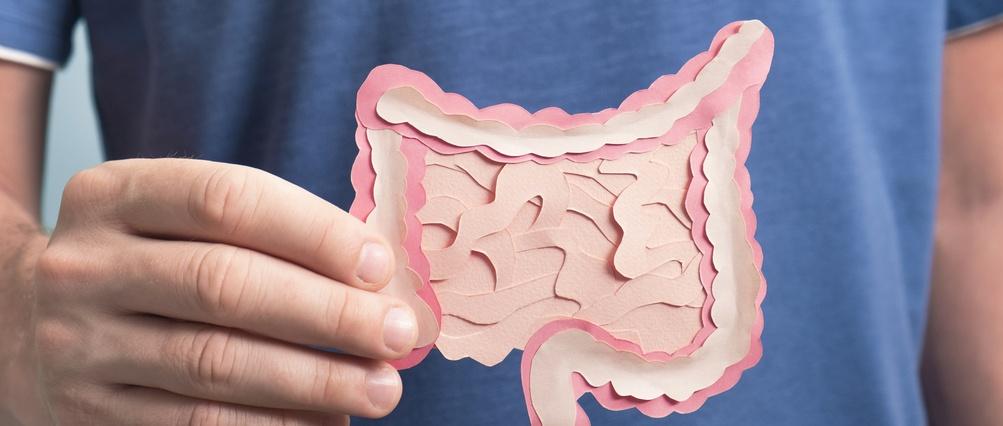
How your gut affects your overall health
Peer reviewed by Dr Sarah Jarvis MBE, FRCGPLast updated by Gillian HarveyLast updated 5 Dec 2018
Meets Patient’s editorial guidelines
- DownloadDownload
- Share
- Language
- Discussion
We all know that when things aren't right with our digestion we can feel generally unwell. But evidence is mounting that the gut - which contains 70-80% of our immune tissue - could have an even greater impact on our overall health than once thought.
It's time to listen to our gut feelings.
In this article:
Continue reading below
The impact of existing conditions
Those of us who suffer from diagnosed bowel conditions such as irritable bowel syndrome or inflammatory bowel disease will be well aware that these conditions can cause or exacerbate symptoms elsewhere in the body. But why is this?
"Your gut has two key functions," explains Dr Anton Emmanuel, consultant gastroenterologist at University College Hospital in London. "One is to absorb nutrients and the other is to secrete insoluble waste. When your gut is not working properly - for example, in the case of illnesses such as Crohn's disease or bowel disease - then the absorption can be impaired. As that's the door through which you get the nutrients to keep you healthy, those suffering from gut illnesses tend also to suffer from generalised body ill health.”
How your stomach affects your overall health
Could your bowel be causing problems?
Back to contentsDespite not having a diagnosed condition, many of us may wonder whether our skin conditions, poor immunity or even poor mental health might be linked to digestive health issues.
Theories abound about the link between poor digestion and our overall health and it is likely that there is a connection. The problem at present is that the necessary tests to confirm these theories have yet to be developed.
"Evidence is gradually accumulating as to the effect of an abnormal microbiome on health and disease," agrees Dr Adam Haycock, consultant gastroenterologist at The London Clinic.
"Unfortunately, we can't yet perform an accurate test, but from a symptom perspective there is very strong evidence to suggest that there's a link," explains Emmanuel. "It's much more likely that the testing we have is not as sophisticated as we'd like it to be rather than people are making things up."
Continue reading below
What is 'leaky gut' syndrome?
Back to contentsSome scientists believe that some illnesses may be caused by a condition known as 'leaky gut', where our bacterial defences have been breached, enabling toxins to leak from our bowel.
"The gut has a huge population of bacteria - 100 trillion," explains Emmanuel. "These are critical in terms of how your body and immune system work. They filter what goes into your body. If they are abnormal in some way it may allow substances into your body that shouldn't be let through."
Or is it a thing at all?
However, again, there is currently no conclusive test to confirm this condition in patients. What's more, many highly reputable gut experts remain to be convinced that there is any truth in the leaky gut theory.
For instance, the Canadian Society of Intestinal Research warns: "Many people are eager to believe that leaky gut syndrome is a valid illness because it seems like an answer to many of their health problems. When you really think about it, one diagnosis that explains arthritis, IBD, skin problems, fatigue, and more seems fictional. Even more unrealistic is that all of these symptoms will go away if the patient just takes a few supplements and avoids certain nutritious foods."
What about my mental health problem?
Back to contentsThose suffering from poor mental health frequently suffer from poor gut health; however, the extent to which the two different conditions affect each other is hard to ascertain. "We know that mental health problems can affect gut health - appetite and function," explains Emmanuel. "And this makes sense when we look at the strong connection between the brain and the gut. But this seems to work both ways - and it's hard to say whether a patient's gut problems are caused by poor mental health or vice versa."
Because of the problem between potential cause and effect, doctors tend to treat the problems individually.
Continue reading below
So, what does this all mean?
Back to contentsWhilst we may not have conclusive proof that certain conditions may be triggered or worsened by gut problems, it makes good sense to look after our gut microbiome. But unfortunately, this may not be as simple as choosing a prebiotic (prebiotics feed our bacteria) or probiotic (containing bacteria) and waiting for our health to flourish.
"There is pretty good evidence that probiotics and prebiotics are good for us and allow bacteria to colonise. There's good evidence in controlled trials that they can be very helpful in terms of gut symptoms and gut illnesses, but also even systemic conditions like psoriasis, rheumatoid arthritis and eczema," says Emmanuel.
However, whilst it makes sense to recharge these friendly bacteria, science still falls short of providing the right solution for each person. "The problem is that each person's gut bacteria are as individual as a fingerprint, so knowing which one you are short of and have too much of is difficult. Currently we don't have a test that says we have too much of X or Y and imbalance of Z. We have products that appear to work through randomised controlled trials and so we can confirm that they help people, but we can't yet tailor it to the individual," explains Emmanuel.
Finding the right formula
Back to contentsWhilst there are far more bacteria in the tablets or powders available from pharmacies than there are in yoghurts or yoghurt drinks widely advertised on TV, simply taking the highest dose of prebiotics and probiotics we can isn't necessarily the answer.
"If it was just a numbers game you were playing you'd tend to go for the capsules or the powder," says Emmanuel. "But it's all about the individual need. Some will do well with a yoghurt, some need a liquid or tablet version. It's a bit of a lottery and it's about getting the right ticket, so for you a small dose of the right product could be much more effective than a massive dose of the wrong one."
Despite the difficulty in establishing the correct treatment for each of us, it's certainly worth trying out different prebiotic and probiotic sources, as evidence suggests improving our bacterial population can help to improve symptoms.
As well as in specialist products, probiotics can be found in your kitchen too.
"Fermented foods are a rich source of probiotics - foods like kefir, sauerkraut, pickles, miso and tempeh," explains dietician Priya Tew. "There are also natural prebiotics in our diets - they are undigestible plant fibres. Some examples include Jerusalem artichokes, raw chicory root, raw onions, leeks and garlic, cooked onions, and bananas."
What else can I do?
Back to contentsIn addition to improving our microbiome, Haycock suggests people should: "Drink enough liquid - at least two pints of water per day. Ensure you take a mix of soluble fibre, such as oat bran, barley, nuts, seeds, beans, lentils, peas, and insoluble fibre, which includes wheat bran, whole grains and vegetables," to help keep our digestive tract healthy.
He also recommends we: "Eat a variety of different-coloured fruits and vegetables; having more vegetables than fruit is preferable."
We should also try where possible to use the bathroom when we get the urge, rather than wait for a more opportune time, as holding on to our waste can make our digestive transit more sluggish.
Whilst it may not solve all our health issues, one thing is certain: looking after our digestion can only be a good thing.
Patient picks for Gut health

Diet and nutrition
What is your gut microbiome?
Let’s talk about something small that has a big impact on your health - the gut microbiome. This hidden universe of microbes plays an important role in your wellbeing. How you treat these tiny residents can make a world of difference to how you feel.
by Victoria Raw

Diet and nutrition
The link between gut health and happiness
Research is increasingly suggesting a connection between the mind and the gut - and it's all to do with the trillions of bacteria found there. So could taking better care of the microbiome improve your mental health?
by Natalie Healey
Continue reading below
Article history
The information on this page is peer reviewed by qualified clinicians.
5 Dec 2018 | Latest version

Ask, share, connect.
Browse discussions, ask questions, and share experiences across hundreds of health topics.

Feeling unwell?
Assess your symptoms online for free
Sign up to the Patient newsletter
Your weekly dose of clear, trustworthy health advice - written to help you feel informed, confident and in control.
By subscribing you accept our Privacy Policy. You can unsubscribe at any time. We never sell your data.